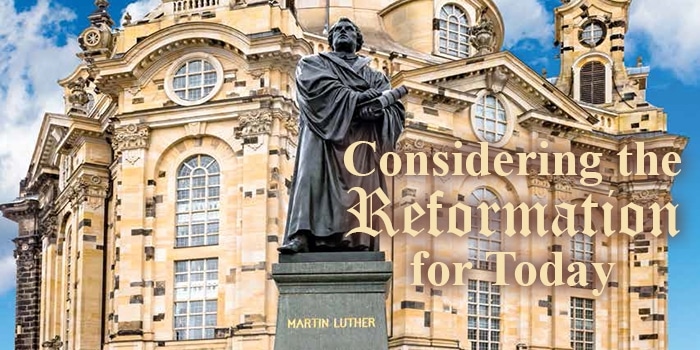
Today it might have started with a tweet, a blog post or a television interview.
But in 16th century Germany, a public conversation began where the public gathered. So, on Oct. 31, 1517, Martin Luther chose the door of the Wittenberg Castle Church to post his “95 Theses,” the opening statement in a debate he hoped to have about corruption within the Roman Catholic Church.
 Michael Fuhrman“In Luther’s time, this was like writing a letter to the editor,” explained Michael Fuhrman, professor of Christian studies at Southwest Baptist University in Bolivar, Mo. “You put something on the door if you thought it would be of community interest. It was his way of saying ‘let’s talk about this.’”
Michael Fuhrman“In Luther’s time, this was like writing a letter to the editor,” explained Michael Fuhrman, professor of Christian studies at Southwest Baptist University in Bolivar, Mo. “You put something on the door if you thought it would be of community interest. It was his way of saying ‘let’s talk about this.’”
In his introduction to the document, Luther claimed to act “out of love for the truth and from desire to elucidate it.” Five hundred years later, Christian voices continue to call for an examination of church practices out of the same love for truth that Luther proclaimed.
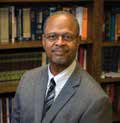 Galen JonesGalen Jones, assistant professor of church planting at Oklahoma Baptist University in Shawnee, Okla., noted, “The Reformers were taking a fresh look at theology and biblical matters and how everything affected their world. We need to do that today.”
Galen JonesGalen Jones, assistant professor of church planting at Oklahoma Baptist University in Shawnee, Okla., noted, “The Reformers were taking a fresh look at theology and biblical matters and how everything affected their world. We need to do that today.”
One of the primary questions of the Reformation was about hierarchy, Jones said.
“They were asking ‘Who really wields power? Is it in the pulpit or the pew?’” he added. “We have the same types of issues today.”
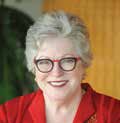 Molly T. MarshallThe great innovation of the Reformation had to do with understanding the priesthood of all believers, said Molly T. Marshall, president and professor of theology and spiritual formation at Central Baptist Theological Seminary in Shawnee, Kan. That principle has never been fully applied in most denominations, and especially not in the Baptist church, where a hierarchy of leadership continues.
Molly T. MarshallThe great innovation of the Reformation had to do with understanding the priesthood of all believers, said Molly T. Marshall, president and professor of theology and spiritual formation at Central Baptist Theological Seminary in Shawnee, Kan. That principle has never been fully applied in most denominations, and especially not in the Baptist church, where a hierarchy of leadership continues.
“Very often pastors think every good idea has to emanate from the pastoral staff,” Marshall said. “Honoring voices of laity would be a better step, allowing lay persons to share in the ministries of church in more integral ways.”
Another important Reformation principle had to do with the dignity of work, in which a variety of professions, not just those associated directly with the church, could be considered a calling, Marshall said.
“It was a way of not creating such a divide between what people do in the world and what people are when they come to worship,” she explained.
Fuhrman noted two dominant examples in today’s workplace: Christians in healthcare professions and those who teach in public schools. In both cases, the believer may not be able to evangelize, but they are representing Christ and his love.
“There are many examples of what ‘every believer a minister’ looks like, but the hoped-for result is that people develop a mental association of Christians as people who love,” Fuhrman said. “Once people find out the Church is a place where they can get loved on, the world will come seeking the church wondering what makes us different. That would open all kinds of doors for witnessing.”
Bringing in New Voices
To get to that point, “laity need to feel more empowered to minister and pastoral staff need to be committed to the empowerment of laity,” Marshall said. In addition to empowering lay members as a whole, ongoing reformation in the church should address the silencing of female voices, Marshall said, noting that “women have not been able to claim their rightful place” in the church.
Including female voices in leadership at the local church and denominational level would not only be more just but the decision-making process in the organizations would be better, Marshall said.
“Studies show that when women are on boards and leadership teams, the whole entity functions in a smarter way because different voices are represented,” she said.
Other distinct voices also are missing in the church, Jones said.
“In the evangelical world today, there is not nearly enough of the voice of the African American theologian, or the Chinese theologian or the Hispanic theologian,” Jones said. “We need to hear fresh voices that have been characteristically shunned.”
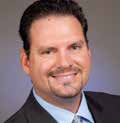 Brian FordFor Brian Ford, executive director of Churchnet, a Baptist network in Missouri, that includes hearing from another often-silenced group — young people.
Brian FordFor Brian Ford, executive director of Churchnet, a Baptist network in Missouri, that includes hearing from another often-silenced group — young people.
“We have so many young people missing in our churches because they’re not finding that the Church is speaking to issues in their daily lives related to racial equity, racism, bigotry and hatred,” said Ford. “To those inside the church who continue to strive for reform, the church must offer opportunities for real leadership and a voice — honestly and intentionally welcoming them into the leadership circle.”
In that way, the Church can go about redefining its prophetic voice, particularly in the political world, Ford said.
“We need to reframe how we talk about politics,” he offered. “I don’t think our church leaders or people of faith should necessarily be on one side or another of an issue. We should be on the side of moral justice, God’s justice and holding both political parties’ feet to the fire on those issues.”
Jones agrees.
“To be a prophetic voice to the nation and to the world, the church can’t be married to politics,” he said. “When you look at the prophets of old, they would be called from obscurity. They were not part of the religious establishment. As the Church of Jesus Christ who is going to be prophetic, we have to divorce ourselves from politics so that we can speak for God.”
Jones longs for “renaissance” rather than “reformation” — rethinking the larger questions of the Church’s role in society, in government, in culture and in the life of its people without abandoning the historical theology and orthodoxy that has advanced over the past 500 years.
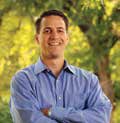 Scott PaceRethinking that role requires strategic thinking, social awareness and spiritual sensitivity, says Scott Pace, associate professor of applied ministry at the Herschel H. Hobbs College of Theology and Ministry at Oklahoma Baptist University in Shawnee, Okla. And when aspects of ministry are not explicitly prescribed or prohibited in Scripture, Pace said believers can and should exercise “Christian liberty” to consider innovative and relevant ways to fulfill the Great Commission.
Scott PaceRethinking that role requires strategic thinking, social awareness and spiritual sensitivity, says Scott Pace, associate professor of applied ministry at the Herschel H. Hobbs College of Theology and Ministry at Oklahoma Baptist University in Shawnee, Okla. And when aspects of ministry are not explicitly prescribed or prohibited in Scripture, Pace said believers can and should exercise “Christian liberty” to consider innovative and relevant ways to fulfill the Great Commission.
“Modern technology, forms of communication or contemporary styles can all be leveraged for the cause of Christ without compromising our fidelity to timeless truths and the sacred text. Our ministries must model for our people how to actively and faithfully engage the culture with the gospel of Christ while also preserving our faithfulness to God’s word. When our members begin to live out this biblical and balanced perspective, the local and global Church will continually be ‘re-formed’ for the glory of God according to his word.”
Carrie Brown McWhorter writes for several publications, including The Alabama Baptist newspaper and Missions Mosaic magazine. Find her on Facebook @McWhorterMedia or visit her website, carriebrownmcwhorter.com.



